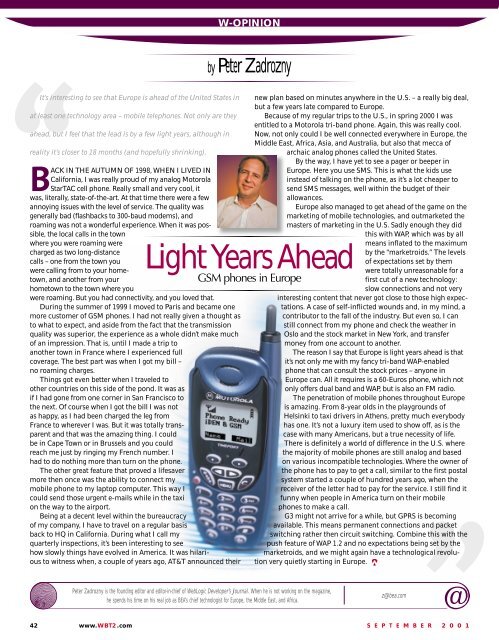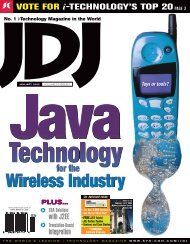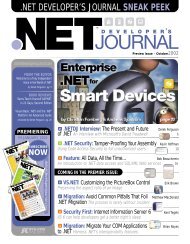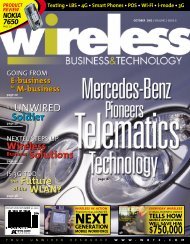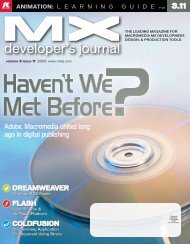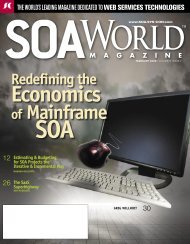wireless primer - sys-con.com's archive of magazines - SYS-CON ...
wireless primer - sys-con.com's archive of magazines - SYS-CON ...
wireless primer - sys-con.com's archive of magazines - SYS-CON ...
You also want an ePaper? Increase the reach of your titles
YUMPU automatically turns print PDFs into web optimized ePapers that Google loves.
It’s interesting to see that Europe is ahead <strong>of</strong> the United States in<br />
at least one technology area – mobile telephones. Not only are they<br />
ahead, but I feel that the lead is by a few light years, although in<br />
reality it’s closer to 18 months (and hopefully shrinking).<br />
BACK IN THE AUTUMN OF 1998, WHEN I LIVED IN<br />
California, I was really proud <strong>of</strong> my analog Motorola<br />
StarTAC cell phone. Really small and very cool, it<br />
was, literally, state-<strong>of</strong>-the-art. At that time there were a few<br />
annoying issues with the level <strong>of</strong> service. The quality was<br />
generally bad (flashbacks to 300-baud modems), and<br />
roaming was not a wonderful experience. When it was possible,<br />
the local calls in the town<br />
where you were roaming were<br />
charged as two long-distance<br />
calls – one from the town you<br />
were calling from to your hometown,<br />
and another from your<br />
hometown to the town where you<br />
were roaming. But you had <strong>con</strong>nectivity, and you loved that.<br />
During the summer <strong>of</strong> 1999 I moved to Paris and became one<br />
more customer <strong>of</strong> GSM phones. I had not really given a thought as<br />
to what to expect, and aside from the fact that the transmission<br />
quality was superior, the experience as a whole didn’t make much<br />
<strong>of</strong> an impression. That is, until I made a trip to<br />
another town in France where I experienced full<br />
coverage. The best part was when I got my bill –<br />
no roaming charges.<br />
Things got even better when I traveled to<br />
other countries on this side <strong>of</strong> the pond. It was as<br />
if I had gone from one corner in San Francisco to<br />
the next. Of course when I got the bill I was not<br />
as happy, as I had been charged the leg from<br />
France to wherever I was. But it was totally transparent<br />
and that was the amazing thing. I could<br />
be in Cape Town or in Brussels and you could<br />
reach me just by ringing my French number. I<br />
had to do nothing more than turn on the phone.<br />
The other great feature that proved a lifesaver<br />
more then once was the ability to <strong>con</strong>nect my<br />
mobile phone to my laptop computer. This way I<br />
could send those urgent e-mails while in the taxi<br />
on the way to the airport.<br />
Being at a decent level within the bureaucracy<br />
<strong>of</strong> my company, I have to travel on a regular basis<br />
back to HQ in California. During what I call my<br />
quarterly inspections, it’s been interesting to see<br />
how slowly things have evolved in America. It was hilarious<br />
to witness when, a couple <strong>of</strong> years ago, AT&T announced their<br />
W-OPINION<br />
by Peter Zadrozny<br />
Light Years Ahead<br />
GSM phones in Europe<br />
Peter Zadrozny is the founding editor and editor-in-chief <strong>of</strong> WebLogic Developer’s Journal. When he is not working on the magazine,<br />
he spends his time on his real job as BEA’s chief technologist for Europe, the Middle East, and Africa.<br />
new plan based on minutes anywhere in the U.S. – a really big deal,<br />
but a few years late compared to Europe.<br />
Because <strong>of</strong> my regular trips to the U.S., in spring 2000 I was<br />
entitled to a Motorola tri-band phone. Again, this was really cool.<br />
Now, not only could I be well <strong>con</strong>nected everywhere in Europe, the<br />
Middle East, Africa, Asia, and Australia, but also that mecca <strong>of</strong><br />
archaic analog phones called the United States.<br />
By the way, I have yet to see a pager or beeper in<br />
Europe. Here you use SMS. This is what the kids use<br />
instead <strong>of</strong> talking on the phone, as it’s a lot cheaper to<br />
send SMS messages, well within the budget <strong>of</strong> their<br />
allowances.<br />
Europe also managed to get ahead <strong>of</strong> the game on the<br />
marketing <strong>of</strong> mobile technologies, and outmarketed the<br />
masters <strong>of</strong> marketing in the U.S. Sadly enough they did<br />
this with WAP, which was by all<br />
means inflated to the maximum<br />
by the “marketroids.” The levels<br />
<strong>of</strong> expectations set by them<br />
were totally unreasonable for a<br />
first cut <strong>of</strong> a new technology:<br />
slow <strong>con</strong>nections and not very<br />
interesting <strong>con</strong>tent that never got close to those high expectations.<br />
A case <strong>of</strong> self-inflicted wounds and, in my mind, a<br />
<strong>con</strong>tributor to the fall <strong>of</strong> the industry. But even so, I can<br />
still <strong>con</strong>nect from my phone and check the weather in<br />
Oslo and the stock market in New York, and transfer<br />
money from one account to another.<br />
The reason I say that Europe is light years ahead is that<br />
it’s not only me with my fancy tri-band WAP-enabled<br />
phone that can <strong>con</strong>sult the stock prices – anyone in<br />
Europe can. All it requires is a 60-Euros phone, which not<br />
only <strong>of</strong>fers dual band and WAP, but is also an FM radio.<br />
The penetration <strong>of</strong> mobile phones throughout Europe<br />
is amazing. From 8-year olds in the playgrounds <strong>of</strong><br />
Helsinki to taxi drivers in Athens, pretty much everybody<br />
has one. It’s not a luxury item used to show <strong>of</strong>f, as is the<br />
case with many Americans, but a true necessity <strong>of</strong> life.<br />
There is definitely a world <strong>of</strong> difference in the U.S. where<br />
the majority <strong>of</strong> mobile phones are still analog and based<br />
on various incompatible technologies. Where the owner <strong>of</strong><br />
the phone has to pay to get a call, similar to the first postal<br />
<strong>sys</strong>tem started a couple <strong>of</strong> hundred years ago, when the<br />
receiver <strong>of</strong> the letter had to pay for the service. I still find it<br />
funny when people in America turn on their mobile<br />
phones to make a call.<br />
G3 might not arrive for a while, but GPRS is becoming<br />
available. This means permanent <strong>con</strong>nections and packet<br />
switching rather then circuit switching. Combine this with the<br />
push feature <strong>of</strong> WAP 1.2 and no expectations being set by the<br />
marketroids, and we might again have a technological revolution<br />
very quietly starting in Europe.<br />
z@bea.com @<br />
42 www.WBT2.com S E P T E M B E R 2 0 0 1


